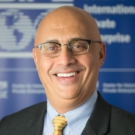Speakers

Abdulwahab Alkebsi
Deputy Director of Programs
Center for International Private Enterprise
Moderator
Event Summary
Washington, DC — March 22, 2018 — Arab Center Washington DC, a nonpartisan think tank that focuses on US policy and developments in the Arab region, hosted a panel on March 20, 2018 at the National Press Club titled “Ending the Humanitarian Crisis in Yemen.” The speakers were Abdulwahab Alkebsi, managing director for programs at the Center for International Private Enterprise; Nabeel Khoury, non-resident senior fellow at the Atlantic Council’s Rafik Hariri Center for the Middle East; and Kristian Coates Ulrichsen, non-resident senior fellow at Arab Center Washington (ACW) and a Middle East fellow at Rice University’s Baker Institute for Public Policy. ACW Executive Director Khalil E. Jahshan moderated the event.
Jahshan said that the United Nations has described the situation in Yemen as “the worst manmade humanitarian crisis of our time,” and he offered statistics about the toll of the war—which started in March 2015—in terms of civilian casualties, disease, famine, devastation, displacement of the people, and catastrophic effects on an entire generation of children. In this context, Jahshan asked, “Is it possible to stop this conflict in Yemen?”
Abdulwahab Alkebsi predicted that if the current situation in Yemen continues, the country would face the worst famine the world has seen in 50 years. He explained that the belligerents, including political parties, warring factions, and tribal leaders, profit from the war by securing external aid and smuggling weapons and contraband. The Yemenis, he noted, depend heavily on remittances from work in other countries, and these opportunities are shrinking. “Out of the six to eight million Yemeni expats,” Alkebsi said, “about two million of them are in Saudi Arabia. A hundred thousand of them have been deported since December, and more will be deported … Each one of [them] is the lifeline, is the one who feeds about a dozen Yemenis.”
Alkebsi described the Saudis and the Houthis as the two major players in the conflict who have “phobias” that need to be addressed. The Saudis believe and fear that Iran would dominate Yemen which would be an unacceptable strategic outcome. Nor would they accept a Houthi-dominated Yemen. “The third phobia for the Saudis,” he continued, “is a stable, militarily strong, economically viable, politically pluralistic Yemen that would be … a model for Saudi opposition with aspirations for the democratic development of their country.” From their part, the Houthis feel that they are fighting a war for survival; they have a phobia about being annihilated. In any final agreement, he said, the Houthis would want a say in national decision-making. Alkebsi concluded that the Yemenis need courage and imagination to build trust and find a peaceful solution to the conflict. Women and youth leaders, in particular, need to be included in the process and empowered to move the country forward.
Nabeel Khoury described the situation in Yemen as intensely polarized. He urged the United States to rethink the prism of terrorism through which it has viewed the conflict. US strategy in Yemen has to focus on the pressing issues of domestic politics and development needs in the country. The drone strikes in Yemen, which started under the Obama Administration, did not constitute a wise policy or strategy, Khoury opined. He advised the creation of an international development fund for Yemen that would underwrite infrastructural projects including roads, schools, clinics, and water management.
Khoury said that Saudi Arabia’s hyper-focus on Iran obfuscates the reality that it is the Yemeni Houthis who are attacking the Saudis. “Iran does help the Houthis,” he asserted. “But by that logic, it is the US that is fighting in Yemen and not Saudi Arabia … The bombs, smart or dumb, that are falling on Yemen are American made. The jets that are dropping them on Yemen are US made. The logistical support for that whole war, including the naval blockade, is provided by the US and Britain … You have to de-conflate the issues. Yemen is Yemen, it is not Iran.” Indeed, Khoury said, many Yemenis call it the “US-Saudi war” against Yemen. He suggested that the United States and Saudi Arabia work as partners to solve the humanitarian crisis by “reconciling and reconstructing” the country. “There are forces in the north and in the south that are pulling the country apart,” he said. To him, Yemen should stay united. He believes that a viable solution could be a loose federation—and not a partitioned Yemen—with a democratic government that guarantees everyone’s rights.
Kristian Coates Ulrichsen said that the crisis in Yemen has been “an unmitigated catastrophe” for the Yemenis. For the Saudis, he pointed out, “the cost of war is already extremely high … the military budget is the highest component of the Saudi national budget.” Only through increasing the political costs of the war, he said, would the protagonists in the conflict—the Saudis and Emiratis—be moved to end it. He noted that political pressure on the United States, such as the current resolution in the Senate that questions American military involvement in Yemen, is also important.
Ulrichsen said that Kuwait’s two-year position on the UN Security Council has the potential to bring together regional and international approaches to solving the conflict in Yemen. He characterized Yemen’s problems as ecological, environmental, and resource-based; years of conflict and three years of “unrelenting bombardment” have taken a tremendous toll on the country. “If we do not act soon,” he continued, “we will have potentially large-scale ecological migrants.” He agreed that it is important to move beyond the focus on terrorism and security, an approach supported by the western media that propagates the idea that this is a proxy war with Iran. Ulrichsen said Yemeni factions are not defined within political boundaries and agreed that an eventual solution could encompass a flexible, loose federation with fair resource allocation and equitable political decision-making.
Event Highlights
Event Photos



